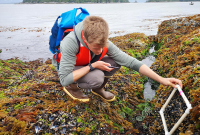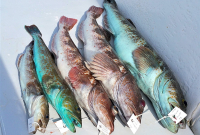Support strong Canadian climate journalism for 2025
A notorious West Coast poacher is banned from stepping aboard a fishing vessel for life after he was convicted of harvesting crabs under the cover of darkness and leading enforcement officers on a dangerous high-speed pursuit.
Scott Stanley Matthew Steer, a repeat offender under Canada’s Fisheries Act, was recently sentenced to a lifetime fishing ban and prohibited from being on board any fishing boat by a B.C. Supreme Court Judge after being convicted of five offences.
But the poacher represents a smaller catch in a more difficult effort to crack down on the larger black market for illegal seafood, experts say.
Steer and two accomplices were charged with various offences after they were caught unlawfully fishing for crab in Vancouver Harbour on March 1, 2020.
Sea Bus operators transiting the harbour reported a small stationary vessel without lights on around midnight. The Coast Guard then dispatched a fast-response vessel with fisheries officers on board to investigate.
As the Coast Guard approached the suspect vessel, it took off driving erratically at speeds up to 70 kilometres an hour through the busy commercial harbour before being boarded near Lonsdale Quay, according to court evidence.
Steer was arrested with approximately 250 live crabs and various forms of crab fishing equipment and commercial crab traps.

In May, Justice Peter Edelmann found the Gabriola Island-based harvester guilty of fishing without a licence, fishing out of season and possession of illegally caught crab, as well as breaching previous court orders not to be on fishing boats or in possession of fishing equipment.
The lifetime harvesting ban is the first in the Pacific Region in over a decade, said Art Demsky, detachment commander with Fisheries and Oceans Canada.
“He is one of the reasons why we continue to have problems with the over-exploitation of our fisheries,” said Demsky, noting Steer is still awaiting two other trials for alleged fishing violations.
Poaching threatens the sustainability of fish stocks, undermines effective management of resources and hurts coastal communities and traditional food sources for Indigenous communities, he added.
In addition to the bans, Steer was sentenced to six months in jail, minus time served; an additional three years’ probation; a year-long curfew; and 75 hours of community work.
He also can’t buy or sell fish for five years and was ordered to forfeit the $50,000 aluminum boat used in the illegal poaching expedition.
Sammy Williams, a member of Steer’s crew, was also convicted and is slated for sentencing in the new year. Cristopher Schill, who was also on board, pleaded guilty in a separate trial.
But despite the significant punishments levied against Steer, it will do little to curb the remaining black market for illegally caught seafood, which likely involves an established network of processors and exporters to international markets such as Asia, Demsky said.
“If you are harvesting fish illegally, you have to get rid of them,” he said. “Somebody has to buy your fish and resell them.”
Black markets exist for crab, halibut and rockfish, which are all lucrative fisheries in B.C., as well as threatened abalone and salmon and illegal shark fins, Demsky said.
Not unlike the drug trade, it’s hard to estimate how much illegal seafood finds its way into the market and its overall impacts on conservation or fish stocks, he said.
“There's no paperwork, and it’s not easily traceable and kept a secret,” he said.
“People don't openly sell illegal products, it's something like drugs and they become part of an underground economy.”
Offending harvesters work to prevent investigators from identifying the brokers or processors that buy their seafood, said Demsky, adding Steer threw his cellphone — which might have contained much of that data — overboard before his arrest.
Dyhia Belhabib, an environmental scientist and researcher specializing in illegal fishing, said it’s good news an offender like Steer, who has intentionally and habitually flouted laws, has received such stiff penalties.
But investigations into who is laundering the illegal seafood harvester’s catch for the market is the only way to curb the impacts the practice has on coastal communities and conservation, said Belhabib, also principal fisheries investigator at Ecotrust Canada.
“Banning him from fishing is great, but it’s not going to stop the people he’s been fishing for,” she said.
“Those are the people we want to identify…because if you break that structure, you will break illegal fishing.”
There is a lack of data, intelligence and in-depth investigation necessary to unravel a complicated financial network, Belhabib said.
“It's not necessarily a lack of competence; I would call it lack of capacity,” she said, adding such complicated and costly investigations would span multiple departments and agencies.
Regardless, Steer and his repeated and flagrant violations for profit don’t reflect the more common pattern of violations typified by coastal harvesters, she said.
Many fisheries rules are complex, complicated, outdated or seemingly ridiculous, so they get violated by accident, or because harvesters can’t understand why the regulations exist, Belhabib said.
Other violations are intentional but reflect a demonstrative action to assert rights, as in the case with some instances involving Indigenous harvesters, she added.
Fisheries and Oceans Canada could drive down the more common and isolated violations by focusing more on collaboration rather than enforcement, Belhabib said.
“I think there is a need to talk with fishermen, to collaborate with communities, and to give them the benefit of the doubt,” she said.
“There needs to be a conversation ... a way to perceive fishermen not as criminals but as actual people who will contribute to solving the problem.”
Rochelle Baker / Local Journalism Initiative / Canada’s National Observer







Comments
Any locations on Vancouver Island selling crab? I know of one large operation. Where does all their product come from and how do they prove it?